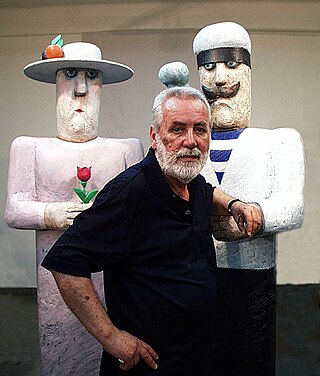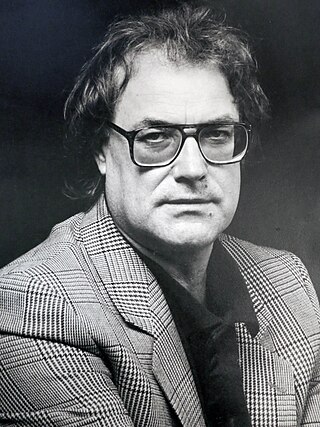
Mira Furlan was a Croatian-American/Yugoslav-American actress and singer. Internationally, she was best known for her roles as the Minbari Ambassador Delenn in the science fiction television series Babylon 5 (1993–1998), and as Danielle Rousseau in Lost (2004–2010), and also appeared in multiple award-winning films such as When Father Was Away on Business (1985) and The Abandoned (2010).

Rade Šerbedžija is a Croatian actor, director and musician. He is known for his portrayals of imposing figures on both sides of the law. He was one of the best known Yugoslav actors in the 1970s and 1980s. He is internationally known mainly for his role as Boris the Blade in Snatch (2000), his supporting roles in such Hollywood films as The Saint (1997), Mission: Impossible 2 (2000), X-Men: First Class (2011), Harry Potter and the Deathly Hallows: Part 1 (2010), and Taken 2 (2012); and for his recurring role as former Soviet Army General Dmitri Gredenko in Season 6 of TV action series 24.

Vjesnik was a Croatian state-owned daily newspaper published in Zagreb. Originally established in 1940 as a wartime illegal publication of the Communist Party of Croatia, it later built and maintained a reputation as Croatia's newspaper of record during most of its post-war history. It ceased publication in April 2012. "Tiskara Vjesnik" and "Vjesnik d.d." were the namesakes of the Vjesnik's printing office and publishing house, respectively.

Filip Šovagović is a Croatian actor, film director, comedian, playwright and journalist. At first known simply as the son of renowned actor Fabijan Šovagović, he has established himself as one of the most prolific Croatian actors of the 21st century.

The cinema of Croatia has a somewhat shorter tradition than what is common for other Central European countries: the serious beginning of Croatian cinema starts with the rise of the Yugoslavian film industry in the 1940s. Three Croatian feature films were nominated for the Academy Award for Best Foreign Language Film, several of them gained awards at major festivals, and the Croatian contribution in the field of animation is particularly important.

Vasko Lipovac was a Yugoslavian and Croatian painter, sculptor, printmaker, designer, illustrator and scenographer and one of the most prominent artists of the region. He is best known for his minimalist figuration and use of intense, unmodulated and often dissonant palette. With the exception of his juvenile period of geometric abstraction, he remained loyal to figuration throughout his whole career. Exceptionally prolific, he worked in various techniques and was equally skilful in using high-polished metal, polychromous wood, enamel, terracotta or polyester to create his sculptures, reliefs and mobiles.

Lordan Zafranović is a Croatian-Czech-Yugoslav film director. He was a major figure of the Prague Wave.

Nenad Kljaić is a Croatian former handball player and current coach of Greek club Serbia.

Žarko Puhovski is a Croatian professor, political analyst, philosopher and intellectual, former president of the Croatian Helsinki Committee.
Music Biennale Zagreb is an international festival of contemporary music in Zagreb, Croatia, organized by the Croatian Composers' Society. The Biennale, founded by Milko Kelemen and held every spring of the odd years since 1961, has become one of the most important festivals of contemporary music in Europe.

The Zagreb Jewish Film Festival (JFF) is an annual film festival held in Zagreb, Croatia which is dedicated to preservation of memories on Holocaust and on raising public awareness about the importance of tolerance.

Ciguli Miguli is a 1952 Yugoslav political satire film directed by Branko Marjanović and written by Joža Horvat. It was meant to be the first satirical film of the post-World War II Yugoslav cinema, but its sharp criticism of bureaucracy was politically condemned by the authorities and the film was banned as "anti-socialist".

Fadil Hadžić was a Croatian and Yugoslav film director, screenwriter, playwright and journalist, mainly known for his comedy films and plays. He was born in Bileća in Bosnia and Herzegovina, but mainly lived and worked in Zagreb, with the Croatian and wider Yugoslav productions.

Branko Gavella was a Croatian theatre director, critic and essayist.
Branko Marjanović was a Yugoslav film director and editor.
The Association for the Yugoslav Democratic Initiative was a political party in SFR Yugoslavia. It is widely considered the first independent all-Yugoslav political movement.
Miodrag Krivokapić is a Serbian actor. He completed the Zagreb Academy of Dramatic Art in 1975. He remained in Zagreb after graduation, becoming a member of the ensemble of the Gavella Drama Theatre, later moving to the Croatian National Theatre in Zagreb, where he remained until 1986. Upon the breakup of Yugoslavia he left Zagreb, and in 2005 joined the ensemble of the National Theatre in Belgrade. He has appeared in numerous theatre, film, and television productions in Yugoslavia and its successor states.
Nenad Polimac is a Croatian film critic.

Dalibor Grubačević is a Croatian composer, musician and record producer renowned for his works in the field of film music.

Dejan Jović is a political scientist from Croatia. He is a full-time professor at the Faculty of Political Science at the University of Zagreb. From 2012 to 2020, Jović was editor-in-chief of the Croatian Political Science Review, one of the leading academic journals of political science and social science in Southeast Europe. He is also one of the founders and editor-in-chief of the peer reviewed journal Tragovi: Journal for Serbian and Croatian Topics published by the Serb National Council and the Archive of Serbs in Croatia.














